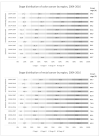Colorectal Cancer Survival in German-Danish Border Regions-A Registry-Based Cohort Study
- PMID: 37760444
- PMCID: PMC10526529
- DOI: 10.3390/cancers15184474
Colorectal Cancer Survival in German-Danish Border Regions-A Registry-Based Cohort Study
Abstract
The aim of this study was (i) to update the reporting of colorectal cancer survival differences over time in the German-Danish border region (Schleswig-Holstein, Southern Denmark, and Zealand) and (ii) to assess the extent to which it can be explained by stage and primary treatment. Incident invasive colorectal cancer cases diagnosed from 2004 to 2016 with a follow-up of vital status through 31 December 2017 were extracted from cancer registries. Analyses were conducted by anatomical subsite and for four consecutive periods. Kaplan-Meier curves and log-rank tests were computed. Cox regression models using data from Schleswig-Holstein from 2004 to 2007 as the reference category were run while controlling for age, sex, stage, and treatment. The cox regression models showed decreasing hazard ratios of death for all three regions over time for both anatomical subsites. The improvement was stronger in the Danish regions, and adjustment for age, sex, stage, and treatment attenuated the results only slightly. In 2014-2016, colon cancer survival was similar across regions, while rectal cancer survival was significantly superior in the Danish regions. Regional survival differences can only partially be explained by differing stage distribution and treatment and may be linked additionally to healthcare system reforms and screening efforts.
Keywords: Kaplan–Meier estimate; benchmarking; chemotherapy; colorectal neoplasm; health care quality; neoplasm staging; proportional hazard models; radiotherapy; surgery.
Conflict of interest statement
The authors declare no conflict of interest.
Figures





References
-
- Cardoso R., Guo F., Heisser T., Hackl M., Ihle P., De Schutter H., Van Damme N., Valerianova Z., Atanasov T., Májek O., et al. Colorectal cancer incidence, mortality, and stage distribution in European countries in the colorectal cancer screening era: An international population-based study. Lancet Oncol. 2021;22:1002–1013. doi: 10.1016/S1470-2045(21)00199-6. - DOI - PubMed
-
- Allemani C., Matsuda T., Di Carlo V., Harewood R., Matz M., Nikšić M., Bonaventure A., Valkov M., Johnson C.J., Estève J., et al. Global surveillance of trends in cancer survival 2000–14 (CONCORD-3): Analysis of individual records for 37,513,025 patients diagnosed with one of 18 cancers from 322 population-based registries in 71 countries. Lancet. 2018;391:1023–1075. doi: 10.1016/S0140-6736(17)33326-3. - DOI - PMC - PubMed
-
- Lundberg F.E., Birgisson H., Johannesen T.B., Engholm G., Virtanen A., Pettersson D., Ólafsdóttir E.J., Lambe M., Lambert P.C., Mørch L.S., et al. Survival trends in patients diagnosed with colon and rectal cancer in the Nordic countries 1990–2016: The NORDCAN survival studies. Eur. J. Cancer. 2022;172:76–84. doi: 10.1016/j.ejca.2022.05.032. - DOI - PubMed
-
- Araghi M., Arnold M., Rutherford M.J., Guren M.G., Cabasag C.J., Bardot A., Ferlay J., Tervonen H., Shack L., Woods R.R., et al. Colon and rectal cancer survival in seven high-income countries 2010–2014: Variation by age and stage at diagnosis (the ICBP SURVMARK-2 project) Gut. 2021;70:114–126. doi: 10.1136/gutjnl-2020-320625. - DOI - PubMed
Grants and funding
LinkOut - more resources
Full Text Sources

